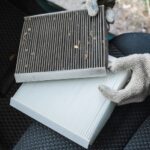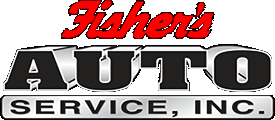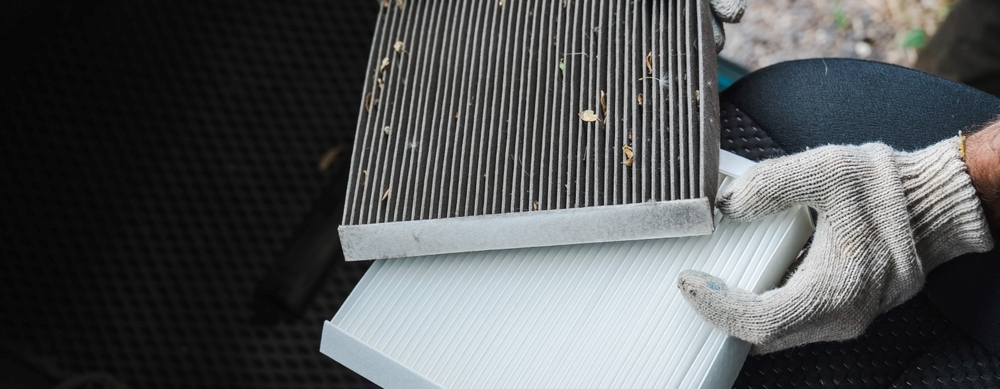 Does the inside of your car smell like your gym’s locker room? If you answered “yes,” then I’ve got some good news and some bad news for you. The bad news is your vehicle is not supposed to do that, and it may cause issues with your overall health and that of your car. The good news is it’s easy to fix. Continue reading to discover how replacing a dirty cabin air filter will eliminate that musty smell, reduce your allergies, and provide clean air for you and your passengers.
Does the inside of your car smell like your gym’s locker room? If you answered “yes,” then I’ve got some good news and some bad news for you. The bad news is your vehicle is not supposed to do that, and it may cause issues with your overall health and that of your car. The good news is it’s easy to fix. Continue reading to discover how replacing a dirty cabin air filter will eliminate that musty smell, reduce your allergies, and provide clean air for you and your passengers.
What Does A Cabin Air Filter Do?
A cabin air filter removes particulate matter like dust, pollen, and exhaust from the air in your vehicle’s cabin. This filtration process improves the quality of the air you breathe inside your car. They also increase the efficiency of your vehicle’s climate control – the air conditioning and heater. A dirty filter may limit airflow from the vents due to debris build-up.
Where Is The Cabin Air Filter?
The location of your cabin air filter depends on the year, make, and model of your vehicle. You can often find it behind the glove box or under the dashboard. However, some cabin air filters are located in the engine compartment near the windshield. You can read your owner’s manual for specific information on finding the filter in your vehicle.
How Often Does It Need Replacing?
Replacement recommendations vary by manufacturer and vehicle model. At a minimum, you should replace the cabin air filter once a year. People with allergies or breathing sensitivities would benefit from a new filter whenever the seasons change (2-3 times a year). Environments with a high pollen count, dust, and heavy traffic produce more contaminants. Keep these factors in mind when determining your air filter replacement schedule.
Different Types Of Cabin Air Filters
Air filters are not universal or created the same way, so always choose the correct cabin air filter for your vehicle model. They come in a wide variety of sizes, styles, and types. Your owner’s manual should contain the size and type required for replacement. Some aftermarket brands may offer upgraded filter options for your car. Choose the filter that best fits your needs for clean air.
Particle Filters
The most common type of cabin air filter is a particulate filter. They consist of a paper-like material that removes over 90% of airborne particles like dust, pollen, bugs, leaves, and smoke. This basic filter provides clean air inside your car very well.
Activated Charcoal Filters
Activated charcoal filters work like particle filters but also have a layer that captures odors and pollutants like nitrogen oxide, sulfur dioxide, and ozone. These filters are very good at removing that musty smell. Some manufacturers equip their vehicles with these enhanced filters, while others do not. It may be possible to upgrade a standard particle filter to an activated charcoal filter for drivers with respiratory conditions. Consult your auto technician for more details.
Electrostatic Filters (HEPA)
Experts consider electrostatic filters ‘premium’ since they do everything a standard particle filter does. Plus, they attract and trap harmful ultra-fine particles like cigarette smoke, ozone, brake dust, and diesel exhaust. These filters contain more layers, making them more effective than traditional filters at producing clean air. However, they are denser and have lower air permeability than conventional cabin air filters. This type of filter must be considerably bigger than a conventional filter to achieve adequate airflow. Do not use a HEPA filter for your cabin air filter unless it is made specifically for your vehicle year, make, and model to avoid taxing (and possibly damaging) your engine and HVAC system.
Dirty Cabin Air Filters = Musty Smell + More
It’s usually fairly obvious when your cabin air filter needs replacement. The biggest tip-off is the old-gym-bag musty smell inside your car. But, if you drive with the windows open or use an air freshener in your vehicle, foul odors may be reduced enough to go unnoticed. Drivers who suffer from seasonal allergies should track their symptoms while driving. If allergies get worse while in the car, it’s time to replace the filter. A dirty cabin air filter can also cause additional issues and causes of concern, such as:
- Foul odors like a musty smell
- Foggy windows
- Inefficient HVAC system
- Mold and/or bacteria growth
- Noisy vents
- Reduced airflow from the vents
- Triggers allergies: runny nose, watery eyes, asthma, sneezing, etc.
Benefits Of A New Cabin Air Filter = Clean Air
Clean air in your car is a huge benefit of a new cabin air filter. Clean air keeps drivers more alert and healthier than breathing air full of pollutants. Other benefits include:
- Increased visibility by eliminating foggy windows
- Less allergies
- Keeps HVAC system running efficiently
- Neutralizes foul odors like the stale, musty smell
- Quieter vents with more airflow
- Reduces exposure to mold, mildew, and bacteria
Routine Maintenance Services
The replacement frequency of your cabin air filter depends on your driving conditions and your health sensitivities. Generally, most auto manufacturers recommend replacing the cabin air filter every 12,000-15,000 miles. However, driving in heavy traffic, dusty, or high-pollen-count environments means you may require more frequent replacements. At Fisher’s Auto Service, Inc. in Kirkland, WA, we understand the nuances of eliminating the musty smell with fewer allergies through your vehicle’s cabin air filter. Let our experienced technicians assist you with determining the best replacement schedule for your cabin air filter.
Make Your Cabin Air Filter Appointment
Call us at (425) 441-3586 or visit us online to make your next cabin air filter replacement appointment.

